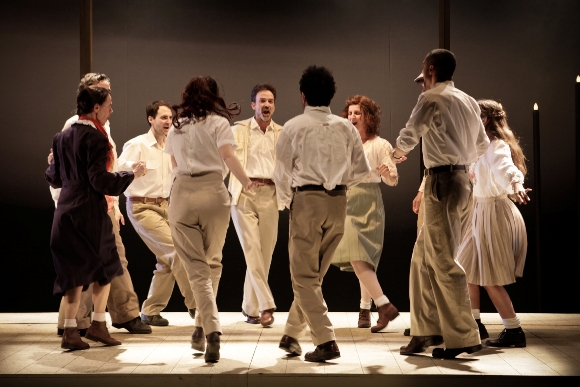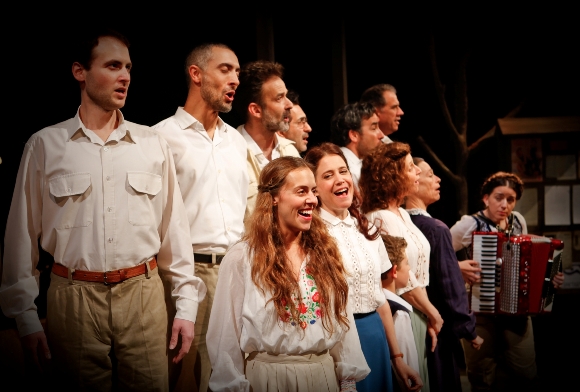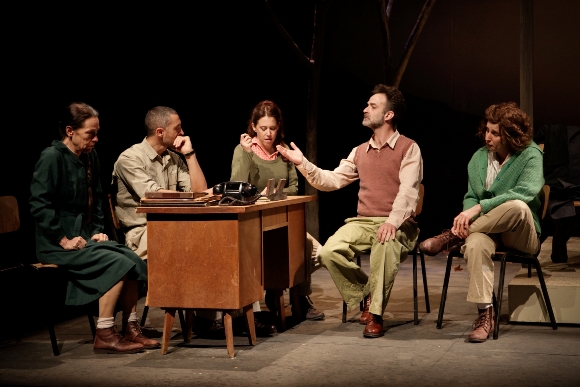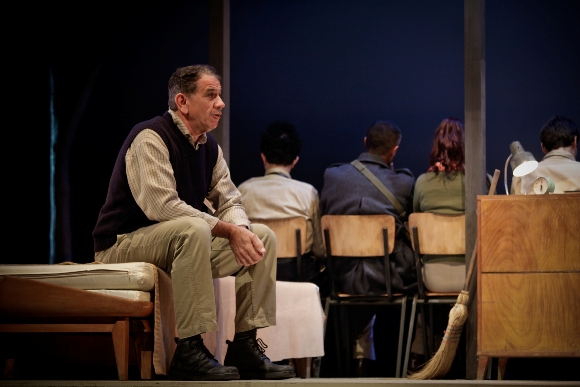Between Friends steps into that most intimate of intimate circles, the daily life of a Kibbutz. Today, the Kibbutz as an entity has all but ceased to exist. Yes, there are still places with the name “Kibbutz,” but most have as much in common with any small town or rural village as they have with one another, very few retain the ideology and distinct socio-economic order of the utopia to which the Kibbutz aspired. For many years Kibbutz ideology held such a revered status and exerted such influence that no one dare criticize any aspect of the Kibbutz, at least not out loud and in public. That era of awe is long gone, and there have been any number of scholarly articles, books and films that look into that closed community with a critical eye, often written by those who were Kibbutz members themselves, such as the author Amos Oz.

Hagit Rehavi Nikolayevsky’s play takes its inspiration from Oz’s eponymous novel, yet chooses to focus on the internal politics and interpersonal relations on the fictional Kibbutz Yikhat, without delving much into the external political context. This choice makes for a very warm and intimate portrait that brings a bygone era to vivid life. Yikhat may be an imaginary place, yet anyone familiar with life on a Kibbutz in those times, will instantly recognize the people and the familiar tropes of the Kibbutz. While there is probably a generation or two of Israelis who will surely sigh or chuckle in recognition, for those who are unfamiliar with the Kibbutz and its history, it is like a time capsule that comes complete with its own cultural decoder. You don’t really need to speak Kibbutz to understand and enjoy this play.

Set during the Hannukah holiday, the play begins with a group sing-along, a Kibbutz staple. Aya Kaplan’s directing and the music by Ran Bagno succeeds at once in conveying the spirit of the times and our own distance from that life. Celebrating the festival of lights, a large outdoor Hannukiah in the background, smiling, singing, their faces radiate a hearty, wholesome satisfaction, perhaps somewhat smug and too self-assured. Yet this scene soon dissolves into another: night on the Kibbutz and Yoav (Nimrod Bergman) Karni the Kibbutz secretary, begins his turn for a week of guard duty. Night reveals the darker aspects of this idyll: Roni Shendlien (Muli Shulman) asks Yoav to look in on his son in the children’s home, a romantic couple stroll by, calling into question issues of friendship and betrayal, not to mention the power of gossip – and one begins to see the seething emotions, conflicting opinions and desires that rumble beneath the serene surface, punctuated by the jackal’s howl.
The life of this small community unfolds before our eyes, with a cast of characters who feel familiar, yet evade the predictability of cliché. Yoav the put-upon Kibbutz secretary struggles to solve everyone’s problems in a fair manner, while contending with his own family issues, which he strives to keep private. Yet privacy was never a strong point of the Kibbutz. Gathering by the bulletin board to chat, walking or biking along the Kibbutz paths, everyone knows everything about everyone, and everyone has an opinion.

Virtuous, rigid, cold and abrasive, Lea Shendlien (Shiri Golan) staunchly defends Kibbutz principles – children must not sleep with their parents but in the children’s home, members must work for the good of all and not pursue selfish fulfillment. With her hand on her hip, and finger pointing at Yoav, she preaches in the name of her ideals: “Now, you listen to me, and you listen up good!” Messy hair, bulky sweater and all, she is a busy-body attack-do-gooder par excellence.
Alliances are the name of the game in this closed community, and Lea follows her leader, David Dagan (Amir Krief), even though the clay feet of this educator and man of principle are glaringly obvious. Krief conveys the charisma of the man, whose devotion to the Kibbutz principles of equality is equaled only by his steadfast pursuit of the pleasures of the flesh. After all, what would a utopian society be without free love?
Hanya Kalish (Ora Meirson) is an older Kibbutz member, she’s paid her dues in more ways than one, toughed out the hard times and survived, but now she has one wish, and will fight the whole Kibbutz to have it fulfilled if need be. Zvi Provisor (Yuval Karmi) has also forgone his heart’s inclination for the sake of the collective. As a young man he denied himself an education to labor on the Kibbutz, along the way, other pleasures were postponed indefinitely, and now he is the Kibbutz gardener, wed to his radio, broadcasting the catastrophic news of the moment. Nahum Asherov (Offer Zohar) is a poignant reminder of the Kibbutz ideal in practice, his quiet demeanor, accepting personal sacrifice, there to help without vying for acclaim or attention, and so lonely in his pain.

The costumes by Svetlana Breger, with their predominance of khaki, white ankle socks, sensible shoes, bulky sweaters, and embroidered white blouses for holidays, are spot-on. Judith Aharon’s set design merges well with the themes explored here: insider/outsider, individual/collective, private/public. An open frame suggests the wall of a building, while the roof beams hanging above suggest an older, rural style of architecture. All this is set on a raised rectangular platform that can turn as needed, shifting the view. Particularly suggestive are scenes when the cast, seated on a row of chairs as in a Kibbutz meeting, remain seated as the platform turns, to reveal the simple accoutrements of a Kibbutz room – single bed, table and two chairs, small cabinet – as a private conversation goes on between Hanya and her son Yotam (Nitzan Kalish), the audience has a view of the others from the back, the community is always there, ever-present.
Comic and touching, the people of Kibbut Yikhat fill the stage with a sense of this community, its values and struggles. The small moments are full of insight: Lea tells her husband Roni “our son Yuvali is not a social child,” esteemed educator David Dagan tells his young lover (a former student) “tears are the weapon of the weak.” Yet although the play casts a critical eye on the Kibbutz, that does not necessarily mean that it takes a negative perspective. In this portrait of a community, with its individual and collective flaws and vulnerabilities, one cannot help but be struck by the sense of community, and the extent to which all members of the community are involved and care, care deeply, care so much at times they seem on the verge of physically attacking one another, about the principles and values by which they lead their lives.
Between Friends
After the novel by Amos Oz, written by Hagit Rehavi Nikolayevsky, directed by Aya Kaplan, Set designer: Judith Aharon, Costume designer: Svetlana Breger, Lighting designer: Ziv Voloshin, Composer: Ran Bagno, Choreography: Amit Zamir; Cast: Yael Eitan, Nimrod Bergman, Shiri Golan, Offer Zohar, Yuval Karmi, Ella Columbus (alt. with Liad Amir), Ora Meirson, Avital Pasternak, Amir Krief, Nitzan Rotschild, Muli Shulman.





